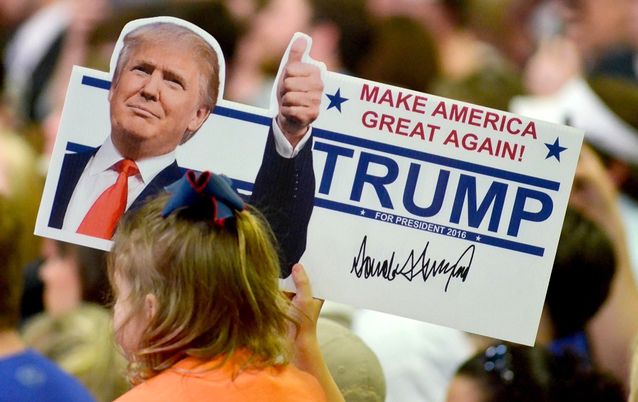WE SHOULD be worried about the rise of Donald Trump, even if he doesn’t make it all the way to the White House.
Decent Americans are rightly concerned about Trump’s dalliance with white supremacy, his insults against women, Muslims and Mexicans, and his enthusiasm for torture. But the US political system contains reassuring checks and balances when it comes to domestic policy.
In foreign policy, by contrast, presidents can make big and irreversible mistakes, and there are few institutional constraints. Although Trump has been sceptical about US military intervention, his vulgar nationalism could escalate peaceful conflicts into violent ones. His trade protectionism, and his refusal to fund the US’s "world policeman" role, could usher in a period of economic uncertainty and geopolitical insecurity.
He probably can’t win. But pollsters, most of whom insist a majority of Americans will never vote for him, have been getting pretty much everything wrong. Unpredictable turnouts of motivated citizens may outlast the primary stage. How can the Trump phenomenon be explained?
Former US treasury secretary Lawrence Summers says Trump’s rise reflects "the political psychology of frustration". Ordinary people see him as their champion in a world that is leaving them behind.
Washington Post columnist Robert Kagan, by contrast, blames Republican Party leaders’ "wild obstructionism", their ridicule of institutions such as the Supreme Court, and their racialised contempt for US President Barack Obama.
Trumpism, however, is far from just a US phenomenon. Long-established democracies have been plagued for decades by antiparty populism and discontent with the political establishment. Scholars have struggled since the 1990s to understand why once-respected politicians now rank alongside sex workers — or even journalists — in the popular low-esteem stakes.
Representative democracy turns on the illusion that citizens understand what their politicians are doing and how well they are doing it. This mirage was once sustained by influential intermediary institutions — the news media and political parties — and by grand narratives that together made the world comprehensible. The idea of the Cold War explained foreign and defence policies, while prosperity, low unemployment and a growing welfare state were presented as the outcomes of elite policy choices.
But the Cold War is over, and idealised models of economic management and the welfare state have turned into a spaghetti bowl of perverse consequences and opaque regulatory institutions. The news media and political parties are increasingly polarising and hollow.
Meanwhile, international integration has undercut assumptions about the character of "the nation". The result has been citizen confusion and anti-establishment politics. Political entrepreneurs have seized on the opportunities this presents. A new generation of strongman politicians, such as Narendra Modi in India, Turkey’s Recep Tayyip Erdogan and Russia’s Vladimir Putin, are perfecting the use of vulgar nationalism to cement domestic electoral coalitions.
Trump’s rise suggests this strategy could work in established liberal capitalist democracies too. Market economies have undermined many of the precapitalist institutional foundations that allowed them to flourish: a virtuous citizenry, stable families, healthy communities and societal trust. Liberal societies have, meanwhile, been destroying some of the prerequisites for democracy that had been bequeathed by the predemocratic era: civility, deference and respect.
Alarmed and confused citizens are sure they have a right to choose. But, increasingly, they do not know how, or to whom, they should listen, or who can help them make sense of their world.
• Butler teaches public policy at the University of Cape Town

Donald Trump rally. Picture: REUTERS/RICK GUY
WE SHOULD be worried about the rise of Donald Trump, even if he doesn’t make it all the way to the White House.
Decent Americans are rightly concerned about Trump’s dalliance with white supremacy, his insults against women, Muslims and Mexicans, and his enthusiasm for torture. But the US political system contains reassuring checks and balances when it comes to domestic policy.
In foreign policy, by contrast, presidents can make big and irreversible mistakes, and there are few institutional constraints. Although Trump has been sceptical about US military intervention, his vulgar nationalism could escalate peaceful conflicts into violent ones. His trade protectionism, and his refusal to fund the US’s "world policeman" role, could usher in a period of economic uncertainty and geopolitical insecurity.
He probably can’t win. But pollsters, most of whom insist a majority of Americans will never vote for him, have been getting pretty much everything wrong. Unpredictable turnouts of motivated citizens may outlast the primary stage. How can the Trump phenomenon be explained?
Former US treasury secretary Lawrence Summers says Trump’s rise reflects "the political psychology of frustration". Ordinary people see him as their champion in a world that is leaving them behind.
Washington Post columnist Robert Kagan, by contrast, blames Republican Party leaders’ "wild obstructionism", their ridicule of institutions such as the Supreme Court, and their racialised contempt for US President Barack Obama.
Trumpism, however, is far from just a US phenomenon. Long-established democracies have been plagued for decades by antiparty populism and discontent with the political establishment. Scholars have struggled since the 1990s to understand why once-respected politicians now rank alongside sex workers — or even journalists — in the popular low-esteem stakes.
Representative democracy turns on the illusion that citizens understand what their politicians are doing and how well they are doing it. This mirage was once sustained by influential intermediary institutions — the news media and political parties — and by grand narratives that together made the world comprehensible. The idea of the Cold War explained foreign and defence policies, while prosperity, low unemployment and a growing welfare state were presented as the outcomes of elite policy choices.
But the Cold War is over, and idealised models of economic management and the welfare state have turned into a spaghetti bowl of perverse consequences and opaque regulatory institutions. The news media and political parties are increasingly polarising and hollow.
Meanwhile, international integration has undercut assumptions about the character of "the nation". The result has been citizen confusion and anti-establishment politics. Political entrepreneurs have seized on the opportunities this presents. A new generation of strongman politicians, such as Narendra Modi in India, Turkey’s Recep Tayyip Erdogan and Russia’s Vladimir Putin, are perfecting the use of vulgar nationalism to cement domestic electoral coalitions.
Trump’s rise suggests this strategy could work in established liberal capitalist democracies too. Market economies have undermined many of the precapitalist institutional foundations that allowed them to flourish: a virtuous citizenry, stable families, healthy communities and societal trust. Liberal societies have, meanwhile, been destroying some of the prerequisites for democracy that had been bequeathed by the predemocratic era: civility, deference and respect.
Alarmed and confused citizens are sure they have a right to choose. But, increasingly, they do not know how, or to whom, they should listen, or who can help them make sense of their world.
• Butler teaches public policy at the University of Cape Town




















Change: 1.24%
Change: 1.37%
Change: 1.21%
Change: 1.09%
Change: 2.14%
Data supplied by Profile Data
Change: 0.46%
Change: 1.28%
Change: 1.30%
Change: 0.00%
Change: 1.64%
Data supplied by Profile Data
Change: 0.79%
Change: 0.70%
Change: 0.63%
Change: 0.98%
Change: 0.69%
Data supplied by Profile Data
Change: 0.72%
Change: 0.73%
Change: 1.16%
Change: -0.70%
Change: -1.56%
Data supplied by Profile Data